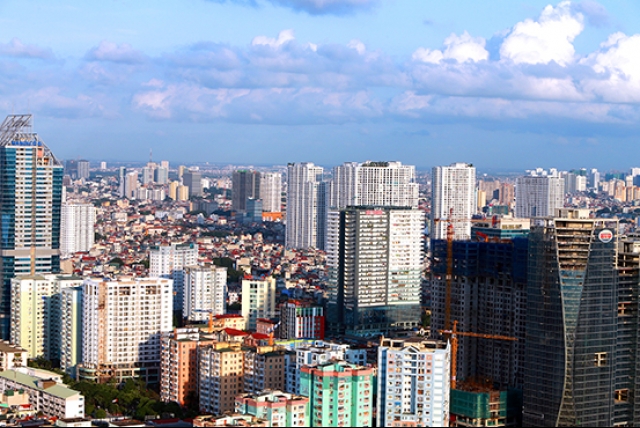What do business leaders think about Vietnam's economic situation?

Mr. Masaaki Kobayashi, General Director, Panasonic Vietnam
Despite major fluctuations in the global economy in 2016, Vietnam recorded GDP growth of more than 6 per cent, which is very positive even though it is a bit lower than in 2015.
With the economic restructuring plan for 2016-2020 and other economic reforms, I think the economy can sustain its high growth rate in the years to come when the government’s actions bear results in improving the business environment. Another highlight is that infrastructure is being invested in and developed throughout Vietnam, from airports to highways and bridges. This is a good sign for the business and investment environment, creating the conditions necessary for foreign corporations to increase their investment in the country.
There is still a lot of room, however, for the business investment environment to develop and improve. One weak point is the absence of support industries, which result in the localization rate standing at just 34 per cent (according to JETRO 2016 figures for Japanese companies), which is low compared to China (68 per cent) and Thailand (57 per cent). Highly-skilled engineers need to be trained in Vietnam to meet requirements and deal with the change that will come from the fourth industrial revolution.
Over the last 50 years, to overcome weaknesses when investing and conducting business in Vietnam, Panasonic has developed a full-function business model, from research and development (R&D) to manufacturing and distribution, and at the same time has steadily developed various corporate social responsibility (CSR) activities to contribute to sustainable social development. We will continue to expand our business in different fields, develop our workforce through R&D activities and human resources development programs, and contribute to society through different educational and environmental projects. More importantly, we will commit to developing high-quality “Made in Vietnam, Make for Vietnam” products in pursuit of “A Better Life, a Better World”.
Mr. Dustin Daugherty, Senior Associate, Dezan Shira & Associates
In maintaining growth at more than 6 per cent over the past year, policy makers have shown themselves more than capable of conducting the administration tasks, reforms, inflation control mechanisms, and macroeconomic policy direction needed to ensure stability in Vietnam’s economy. Prime Minister Nguyen Xuan Phuc’s rise to power in early 2016 is emblematic of this stability and he has shown investors that transitions in power are made with a continued commitment to strengthening reforms.
Reforms in the last year have been focused on economic stability, restructuring the commercial banking system, budget collections, public investment, improvements in the performance of State-owned enterprises (SOEs), and improving the business environment compared to Vietnam’s regional competitors.
Vietnam had a successful 2016 by repositioning itself as a champion of trade and investment among ASEAN members. A free trade agreement between Vietnam and the European Union (EVFTA) was signed in October, followed by a decree to cut import taxes between 2016 and 2018. Together, these actions have played a pivotal role in opening up more opportunities for foreign direct investment (FDI) in the country.
Although the TPP has been put on hold due to the withdrawal of the US, Vietnam has proven itself, through its participation in the TPP alone, to be firmly committed to developing its economic networks. The continual strengthening of ASEAN and Vietnam’s participation in APEC and the Regional Comprehensive Economic Partnership (RCEP) go a long way towards building investor confidence and strengthening Vietnamese institutions.
Mr. Jens Ruebbert, Chairman of EuroCham in Vietnam
We have been impressed by most of the measures taken by Prime Minister Phuc’s government. It is our belief that the government is proactively engaged in making Vietnam a better country to do business in and ensuring it occupies its rightful place in the global market. Concerns over sustainable development, smart cities, and a modern approach to education and training have been noted in 2016, and we hope that these are addressed in concrete policies.
From the “micro” perspective, however, there are still many issues being intensively discussed. Some we outline in our yearly Whitebook, where readers can find EuroCham’s highlighted business and investment issues as well as recommended policies and measures to tackle them in each industry. The latest edition was released in March and our work continues in regular and open dialogue with numerous relevant government authorities, which have been available to discuss key issues with us over the past year.
As mentioned, there is still work to be done in the regulatory and policy dimensions. Licensing and other administrative procedures are among the big topics during dialogue with the government, for instance. On the other hand, the development of proper infrastructure, with progressively more open, transparent, and smart tendering processes, will go a long way towards bringing the private sector, including foreign investors, into building Vietnam’s future.
Mr. Nguyen Son Hai, First Deputy CEO, Vinata Joint Venture Company
In a complex global environment, Vietnam’s economy is still vulnerable to shocks. The decline in growth during the first half of 2016 was due to the environmental pollution incident in central coastal areas and the drought in the south and central highlands. There were some highlights in 2016, however, regarding policies, strong administrative procedure reform, strict and flexible control of monetary policy, and the State Bank of Vietnam retaining the target of inflation stabilization and taking this into account in macroeconomic stability efforts.
In 2016, Vietnam continued to keep a macroeconomic balance, low inflation, and high foreign currency reserves, and enjoyed a trade surplus yet again ($2.84 billion in the first eleven months). Annual GDP growth was estimated at 6.3 per cent, lower than planned but still double the global average and ranking Vietnam among the best-performing countries in this regard. Notably, GDP growth has increased every quarter for many years. The business environment was a spotlight of Vietnam’s economy last year. According to rankings issued by the World Bank, Vietnam jumped nine levels in business environment rankings compared to previous rankings.
Many policies and solutions were adopted by the government in 2016 to improve the business investment environment. But in order to make these policies and solutions become effective in practice, the government has to increase the inspection and supervision of authorities regularly conduct surveys of enterprises, to determine what they need and what problems must be resolved, etc. Enterprises in general and foreign enterprises in particular must be viewed as the backbone of the economy. Comments from entrepreneurs provide the best advice for the government to improve the business environment in Vietnam.
Ms. Tieu Yen Trinh, CEO, Talentnet Corporation
Listed in second place in the Top 10 fastest-growing economies, Vietnam is presented with both challenges and opportunities. Within ASEAN, it is among the Top 3 countries, together with Indonesia and the Philippines, as being a preferred destination for investment. This also provides local investors with increasingly attractive access to make a quick win. However, in terms of the private sector, especially small and medium-sized enterprises (SMEs), there is still much more regarding policy that the government could initiate to bolster its development and improve its profile in the region.
There were many positive changes in business policies last year and this year, which led to Vietnam’s rating by the World Bank regarding the business environment in 2016 increasing nine levels, to 82 out of 189 countries. Many small adjustments and changes have been made over the past year, which I believe had a positive impact on those doing business like us, such as reforms of administrative procedures to shorten the time needed for completion, reducing paperwork and cutting costs for local businesses. This not only helps to improve the business situation but also enhances the number of new business registrations along with the number of people who are satisfied with the business climate.
We look forward to the government (i) redefining the roles of key business sectors in Vietnam and their roadmaps in building the country’s business image in the region; (ii) enhancing connections between education and business, so that the gap in what businesses require and what the education sector provides will be narrowed; (iii) engaging more often with business associations and chambers, since these organizations have a clear understanding of what enterprises are seeking, especially SMEs; and (iv) taking quick action in both attracting and retaining talent, since they are a key resource in business success. Only when talent management is strongly empowered by the government with clear policies and practices can business organizations in Vietnam be confident about their development vision and mission.
Mr. Warrick Cleine, Chairman & CEO, KPMG Vietnam & Cambodia
Business leaders love predictable economic environments. As they cannot control factors such as inflation, economic growth, interest rates, and currency values, they rely on the government to manage the economy in such a manner that these things are stable. This allows them to focus on business growth, development of new products and services, customer relationships, and cost efficiency. The pleasing thing about the last 12 months has been the stability of the macroeconomic environment, and we have seen our clients - foreign and Vietnamese - take advantage of this stability to improve their business performance.
As Vietnam’s economy has modernized and integrated into the global economy, the interests of foreign and domestic businesspeople are increasingly aligned. Both favor business stability, reduced bureaucratic interference, and strong institutions and the like. The government is well aware that the market for foreign capital is global - investors can invest anywhere - and Vietnam needs to be more attractive than other markets if it wants investors to continue to come here. Vietnam’s economic performance and attractiveness among investors is increasingly compared to its ASEAN neighbors, China, and so on. The pleasing thing is that we continue to see Vietnam outperforming these markets in the eyes of global investors.
One of the biggest challenges of the past year for Vietnamese policy makers was the surprise election of Donald Trump and his early withdrawal from the TPP. Both foreign and domestic investors had been relying on the TPP to drive domestic reforms, increase competitiveness in Vietnam’s economy, and provide better access to foreign markets for Vietnamese exporters. This provided a great psychological boost to the business community over most of the last few years.
While it is hard to see the US withdrawal from the TPP as “good news” for Vietnam, the positive aspect is that everyone now realizes that Vietnam’s trading and investment relationships are very diverse. The economy is not overly dependent on any single market, including the US. The importance of Europe, Japan, Australia and other regional markets has been highlighted by the demise of the TPP. The government should now continue to push its trade negotiators and partners to pursue new trade agreements, to ensure domestic reforms are continued, and to support Vietnam’s successful export sector. Vietnam today is a global trading nation, and its near-term prosperity depends on this continuing, even as the US takes a more protectionist stance.
VN Economic Times





















